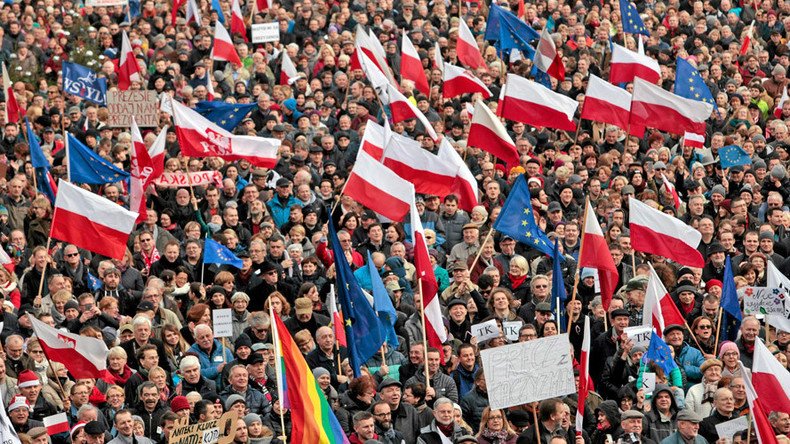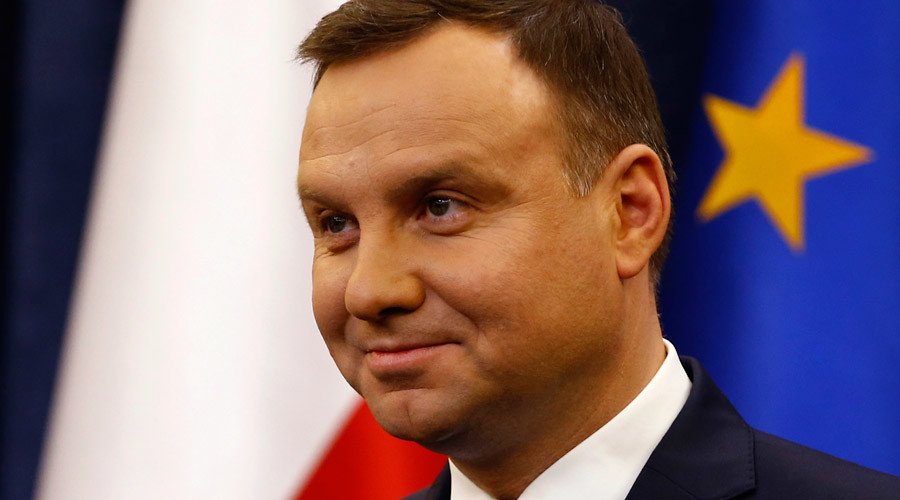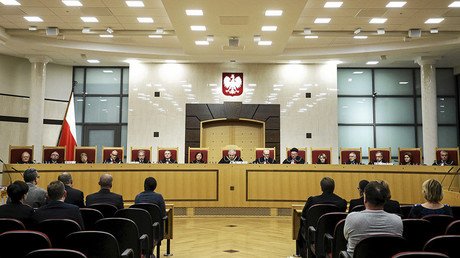No law, no justice and no civic values: Why Poland’s constitutional crisis can only get worse

Recently, Poland has been under intense scrutiny from the international media due to its worst constitutional crisis since 1989, the year of the first free elections in its post-war history.
It became nominally independent after 45 years of Soviet domination as its satellite and the country has embarked on ambitious plan to revamp its society and economy into a fully functioning member of the European Union, which it joined in 2004. However, the western media decried the recent changes in the political landscape in which the eight-year-old rule of the Civic Platform (PO) was replaced in an astonishing rout by the far-right nationalist Law and Justice (PiS) party led by Jaroslaw Kaczynski. Kaczynski designated his protégé, Andrzej Duda, as the country's president, while choosing to pull the strings from behind the scenes.
Kaczynski and his twin brother, President Lech Kaczynski, who died in the 2010 Smolensk plane crash that wiped out dozens of top Polish officials, had a run at the helm of the country a decade earlier, when Law and Justice was in charge for two years. It left a legacy marred with incompetence, conflict, division and political recriminations blamed on the “ever-present" ex-communists that in the Civic Platform’s view still dominated political and economic landscape, even 16 years after the 1989 elections.
Despite Law and Justice’s failure as a viable political force, Lech Kaczynski's death in 2010 in the Smolensk crash ironically resurrected its fortunes. The crash itself has become a Polish version of the 9/11 inside job "Truther" myth, according to which Russia's president, Vladimir Putin, was responsible for the deaths of almost the entire Polish Cabinet. The event also took on deeply religious and metaphysical dimensions as Smolensk was near the site of the mass murder of Polish officers in Katyn, ordered in 1940 by Stalin and subsequently covered up by successive Soviet leaders. In this way, the anniversary pilgrimage of the Polish elite that died in the crash elevated the event to the form of myth, unifying a national narrative of victimhood and reinforcing old prejudices and stereotypes in the very complicated Polish-Russian relations that go back centuries. The accession to NATO in 1999 and the EU in 2004 was sold to the Polish public as a guarantee of Polish sovereignty against its historical threats from both the West (Germany) and the East (Russia).
The current crisis unfolded over the appointment of judges to the Constitutional Court. The traditional division of powers in any constitutional order warrants separation in its executive, legislative and judicial branches, while preserving their independence from each other. According to the furiously critical coverage by the Washington Post, AP, the New York Times and others, Poland has crossed the threshold of totalitarianism, while destroying its image as a "good and democratic partner" of the West.
In addition to the media scorn, the EU also weighed in with a letter sent by European Commission Vice President Frans Timmermans, calling on the Polish government to stop its activities “until all questions regarding the impact of this law on the independence and functioning of the Constitutional Tribunal have been fully and properly assessed.” Of course, the letter was sent out by the Vice-President, and not the president of the EC, on purpose. If it came from the President of the European Commission, former Polish Prime Minister Donald Tusk, the former chairman of the Civic Platform, it would have been used by Law and Justice as proof of treason by its political opponents, who had just lost in the polls.
While rightly condemning the perceived illegality of Law and Justice’s move to pack its own judges into Poland's highest court, the EU and international media did not bother to check out the checkered history of appointments to the court. The center-right Civic Platform’s eight-year rule brought a series of scandals that gave it the well-deserved moniker of the “party of thieves and cheats.” It is widely perceived that Tusk was given his EU position due to his championing a neoliberal economic agenda and an aggressive foreign policy closely allied with the US during his tenure in Poland. The icing on the cake in his current position in Brussels is a de facto personal immunity from any responsibility for his party's actions while in power in Poland.
The Civic Platform’s never-ending series of financial and political scandals culminated in 2014 with “TapeGate,” in which senior government officials were caught on tape at two exclusive restaurants talking about politics, foreign relations and the personalities of the political class worldwide. As soon as the tapes were released and their contents described by Polish magazine Wprost, the Civic Platform government reacted by raiding the office of the magazine and manhandling its editor. This clear violation of Polish law garnered widespread condemnation domestically and abroad.
The tapes revealed the Polish elite in its most natural and perverse state, not unlike Nixon's infamous White House tapes. Punctuated by invective and coarse language, the reality of Poland's deep state was laid bare to the public. While the tapes exposed the ruling class as vain and selfish, it revealed the Polish state for what it really is: a vassal state held hostage to special interests, personal profiteering and the foreign policies of others. In the recorded conversation, then-Interior Minister Bartlomiej Sienkiewicz told his counterpart at the Finance Ministry, Jacek Rostowski: "The Polish state exists theoretically, it doesn't exist practically."
In other recordings, Foreign Minister Radoslaw Sikorski, the husband of neocon activist and Washington Post columnist Anne Applebaum, told Rostowski: “You know, the Polish-American alliance is worth nothing. Actually it is damaging as it creates a false illusion of safety. Complete bullshit. It will get us into conflict with Germany, Russia and we will think that everything is great, since we gave the Americans a bl*w job. We are the chumps. Complete chumps.”
In this way, Poland's foreign policy, starting from its participation in Iraq and Afghanistan, through the existence of the CIA “black sites” on its soil, to the most recent involvement in Ukraine, has been perfectly laid bare for all to see by one of its chief architects. Fast forward to the summer of 2015, and the issue of the government packing the Constitutional Court with its own people. The Civic Platform, fearing that it would lose the elections and be held legally accountable for its eight years in power, decided to break the law and appoint its own supporters as judges. If the process of appointments went well, it would guarantee it de facto immunity from accountability, as any legal verdict could be overturned by its own appointees.
However, running on the themes of accountability and free money, Law and Justice won the presidential and parliamentary elections, giving it a parliamentary majority in the Sejm, the Polish parliament, for the first time. The first thing Law and Justice did was to get rid of two judges, illegally appointed by Civic Platform, and replace them with their own, illegally appointed ones.
However, the real outrage took place over President Duda's pardon for Mariusz Kaminski, the head of the anti-corruption agency during the first Law and Justice administration under Kaczynski a decade earlier.

Kaminski was found guilty of extraordinary abuse of power and sentenced to three years in prison. However, the case was still being heard on appeal and not concluded when Kaczynski's faithful old ally was let off the hook by the pardon, which was completely unexpected. The issue is that the pardon was without precedent, as the legal process had not been completed and the person pardoned had not yet been finally convicted.
This also stopped any investigations into Kaminski's other affairs, therefore violating the basic principle of separation of powers in a democratic state. In this way, ironically, history has come full circle, with the virulent anti-Communists using the tactics of the Communists they profess to despise.
As a result, the revolution against the center-right by the far-right is in the process of being forcefully stopped from the outside by the EU. Some Polish media have gone as far as to call it the “fourth partition” of Poland, with the three previous partitions being carried out by its neighbors in the 18th century. This time around, the offending party is the EU. Despite transferring enormous amounts of money into the country's infrastructure and investments made by its member states, the EU is now stopping the Polish government from violating Polish and EU laws. The EU has been portrayed as a colonizer and exploiter of the worst sort, while the upper-class demonstrators consider the EU the savior against the Law and Justice dictatorship.
Speaking of the worst sort, the divisive words of Jaroslaw Kaczynski, the chairman of Law and Justice and ironically a doctor of law, have only added gasoline to the fire of national recrimination: "In Poland, there is the bad tradition of national treason. This takes place in the genes of some people who are the worst sort of Poles. And right now this worst sort is incredibly active."
Coming shortly after the electoral victory by Law and Justice, which campaigned on a slogan of unifying the country after the misrule of the Civic Platform, these words have created an earthquake in Polish society. Subsequently, many who sat on the sidelines and thought Law and Justice would mature into a responsible political player, which would preserve the status quo and play by the unspoken rules of going and getting along, were terrified.
Law and Justice also cleverly played on the immense divisions between the haves and the have-nots, giving the election campaign a classic populist tint of class warfare.
It took up this populist mantle from the non-existent Polish left, which through a series of compromises and unprecedented political prostitution had virtually eliminated itself from the political scene. Despite its message of economic and political success, the Civic Platform presented a vision completely removed from the reality of most Poles, while giving the ruling elite a feel-good attitude, regardless of the impending electoral crash.
On the other hand, Law and Justice took its failure during its 2005-07 time in office in stride, while portraying itself as defenders of the poor in a classic national-socialist sense of class enemy creation. It made out the Civic Platform and anyone left of it to be the evil force of communism, however non-existent, playing out an old Hegelian "the other" routine.
The electoral promise of 500 zlotys ($ 125) in monthly child benefit for all Polish families clinched the deal. It swayed the naive and gullible into voting for Law and Justice, as it promised to raise the money from a tax on mostly foreign banks and international supermarket chains, which had benefited from increased Polish consumer spending during the Civic Platform years.
Factually, the promise was already broken before it was made. The new government is unable to implement its tax policy change, due to EU investment protection statutes and international double taxation treaties signed by previous administrations. Its idea of taxing not income but revenue is not only regressive, but it smacks of arbitrary interpretation of laws that will undoubtedly result in years of litigation with a very uncertain outcome at the end. It is also utterly cynical, and it mirrored the electoral tactic of ex-President Lech Walesa in the 1990s, as he promised a windfall of 100 million zlotys if he was elected to power. Naturally, the money never materialized and Walesa’s tenure has been widely regarded as a failure.
Furthermore, despite the criticism of Civic Platform’s failure with regard to its policy on Ukraine, Law and Justice recently announced a 4 billion zlotys ($1 billion) line of credit to insolvent and bankrupt Ukraine, despite Poland not having enough money to pay for its own ailing education and medical systems.
The current set of popular demonstrations over the Constitutional Court scandal has puts Poland on a collision course not only with the EU, but its own population as well. Many talk of a Polish color revolution, or a Polish EuroMaidan, as an antidote to the increasingly authoritarian attempts to consolidate power by the Law and Justice government.
The aggressive rhetoric accompanying the transition of power not only at the Belweder, the Polish White House, but all government institutions and state firms, brings out the characteristics of total political warfare. In this way, the only truism of Polish political reality since 1989 is represented by the acronym “TKM- Teraz K***amy,” (‘F**k, it’s our turn now’), has proven that the ruling elites, who rule by patronage, regardless of political color or ideology, has won out over democracy and EU attempts to civilize them.
As result, over 2.2 million Poles have left Poland for other EU countries in the past 12 years, and the ones who stayed behind are witnesses to a process that atrophies the state, rather than making it fully democratic and stronger. In this way, the Republic of Poland is no more.
Instead it is the “Republika Kolesiow” (the “buddy republic”) of the elites who take care of themselves and no one else.
Despite the whole media outcry over the Constitutional Court, and the lies sold to the public as virtues, most Poles are actually quite apathetic, watching the domestic version of Circus Maximus unfolding before their eyes. The ephemeral values of freedom, independence, happiness and personal choice mean nothing when confronted with the “precariat”-like standard of living that allows bare survival, and not much else. Most Poles have already resigned themselves to this reality – and those with dreams are realizing them somewhere else.
The statements, views and opinions expressed in this column are solely those of the author and do not necessarily represent those of RT.















